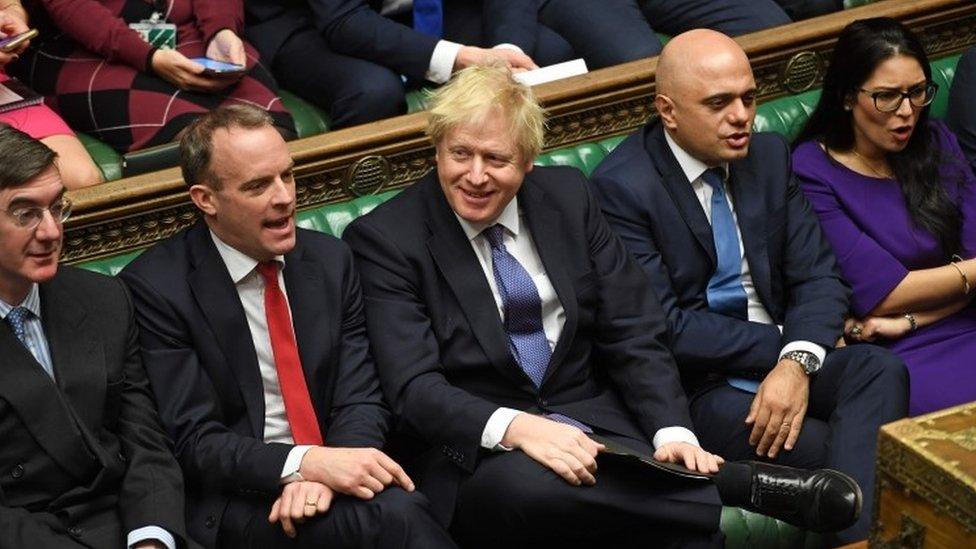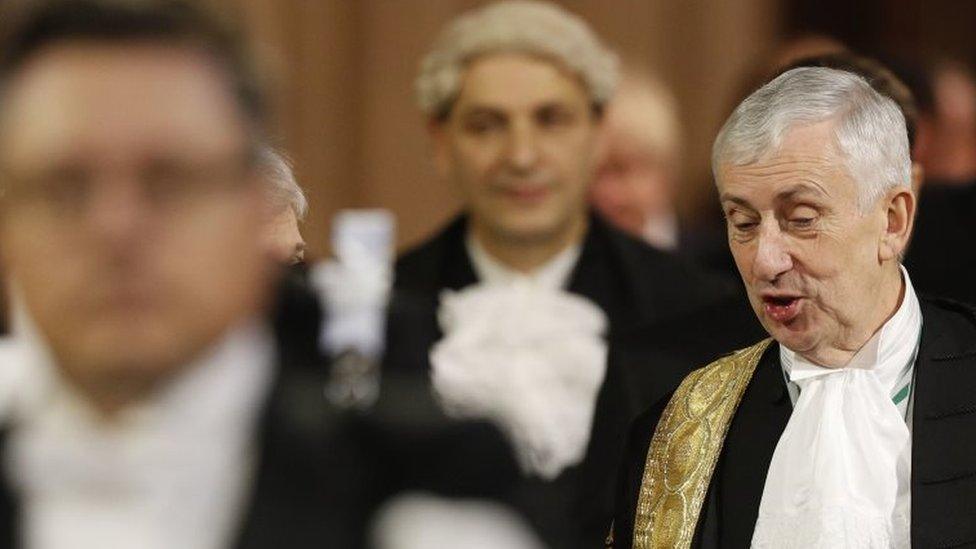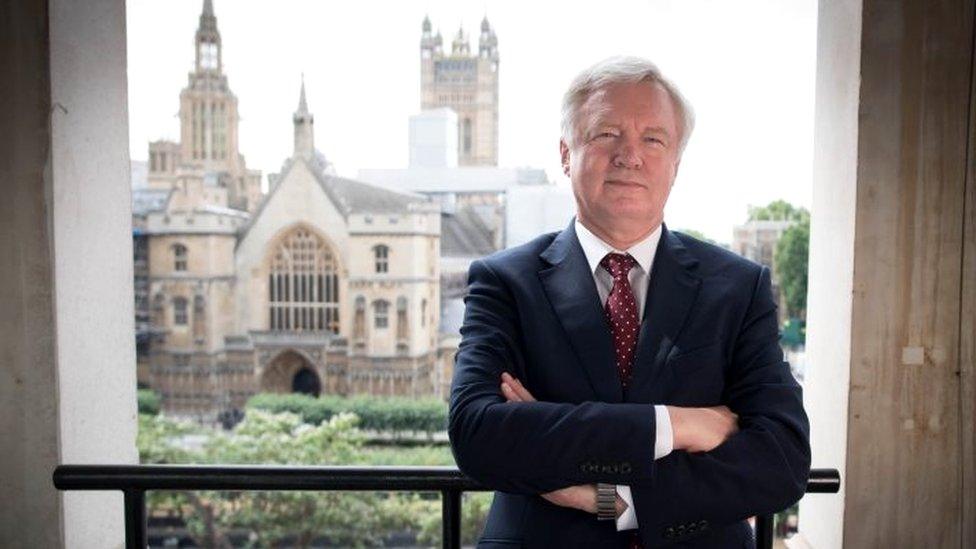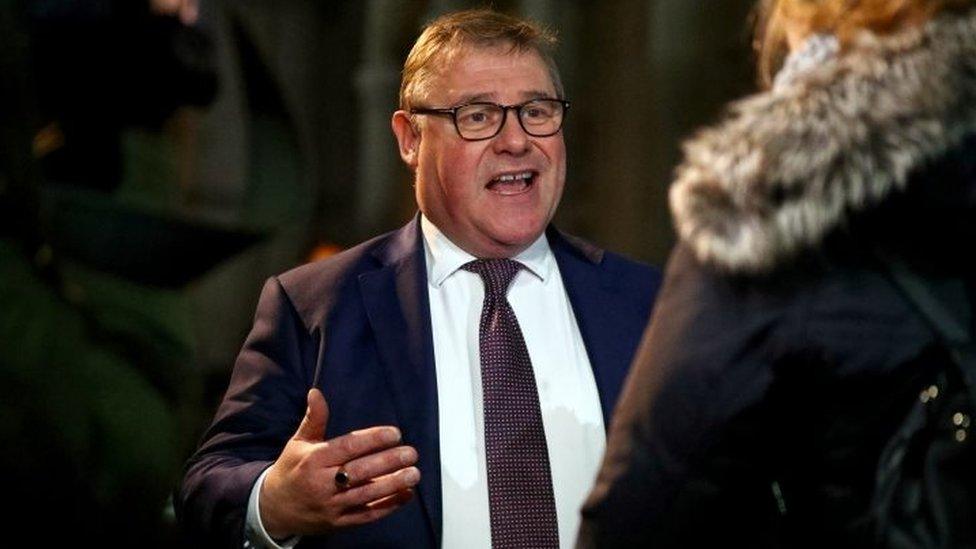Week ahead in Parliament
- Published

It may have been the default setting for most of British political history, but after a decade of coalitions and governments without a functional majority, the return of a one-party majority seems rather novel.
Forget the deadlock of the pre-election Commons, the new government can expect to get its way on legislation and procedure, and control events in a way Theresa May could only dream of.
No more backbench seizures of the agenda, no more knife-edge votes.
This government can put down legislation and push it through, pretty much as it wants.
Which is just as well, because it has a considerable backlog of Brexit legislation and other measures.
The three sitting days in the coming week see the Withdrawal Agreement Bill rushed through the Commons (with debate on the Queen's Speech paused until it is done), allowing peers to sink their teeth into it the following week. And you can expect to see a number of bills published, so that MPs can start work them before January is out.
Meanwhile, a new Parliament means a new set of Private Members Bills, in both the Commons and the Lords. These may provide the main opportunity for non-Brexit legislating in the next few months - and there's a pent-up social agenda awaiting attention, and a chance to test the balance of opinion in the new Commons - assisted dying, anyone?
Tuesday 7 January
The Commons resumes after the Christmas break at 14:30 GMT, with an hour of Treasury Questions - after which expect the usual post-break consignment of ministerial statements and urgent questions.

All eyes will be on new Speaker Sir Lindsay Hoyle
It will be interesting to see if new Commons Speaker Sir Lindsay Hoyle is a little less generous in granting UQs than was his predecessor, John Bercow, but one way or another the ramifications of the Soleimani drone strike looks pretty certain to be raised.
The main scheduled business is the Committee of the Whole House examination of the detail of the European Union (Withdrawal Agreement) Bill. The first day's proceedings will include four hours on the clauses dealing with the implementation of withdrawal agreement and the implementation period for the Bill, and the supplementary powers in the implementation period, including those for devolved authorities.
The markers are going down; Labour are proposing a detailed amendment to ensure consultation of Parliament and the devolved assemblies during the negotiations and there is a big cross party amendment proposed by Green MP Caroline Lucas, along not dissimilar lines.
Labour also want the negotiating objective to be a full customs union with the EU, with close alignment to the single market, while the SNP want membership of both the customs union and the single market. In another amendment they propose to dis-apply the whole Bill to Scotland.
Labour are also proposing a two-year implementation period, to allow the longer term UK-EU relationship to be negotiated if the PM fails to secure agreement on a future partnership deal by the end of June. The Lib Dems have a proposal that would also allow a shorter extension, and further amendments call for a confirmatory referendum on the final deal, and an independent review of the impact of withdrawal.

David Davis wants the UK to start talks with the WTO
Meanwhile, the former Brexit Secretary, David Davis wants the UK to begin engaging with the World Trade Organisation, to kick start the process of seeking new post-Brexit trade deals, while Labour backbencher Debbie Abrahams and Stephen Doughty have an amendment on non-regression from EU standards on workers rights, animal welfare and the environment.
Northern Ireland's DUP have a phalanx of amendments down, intended to prevent any erosion of Northern Ireland's position within the UK, including discrimination against their goods and exclusion from "Made in Britain" schemes.
The second four hour segment of the debate will cover citizens' rights (application deadlines, appeals, professional qualifications, social security, equal treatment) and the proposed Independent Monitoring Authority.
Labour, the SNP and the Lib Dems all have proposals to guarantee the rights of EU citizens resident in the UK, and amendments seeking to reinstate the "Dubs" rules on child migrants. Labour have an amendment to require ministers to attempt to secure family reunion rights, and there is a Lib Dem amendment to force the government to guarantee family reunion rights following Brexit.

Mark Francois wants Brexit day to be marked by Big Ben
There's even an amendment proposed by Uber-Brexiteer Mark Francois and deputy speaker candidate Nigel Evans, to require that Big Ben chimes at the moment of Brexit, 11pm on January 31st. I'm not quite sure on which day this will be considered, if selected by the acting Chairman of Ways and Means, Sir Roger Gale, probably in the "miscellaneous" section at the end....
The day ends with what now looks like a rather well-timed adjournment debate on the role of UK special forces in Iraq and Afghanistan - led by the SNP's defence spokesman Stewart McDonald.
In the Lords (14:30 GMT) peers will question ministers about the repair of London's Hammersmith Bridge, protecting opportunities to work in Europe for British citizens - and the Conservative manifesto commitment to deliver 50,000 more nurses.
Then they resume their debate on the Queen's Speech, focusing on foreign affairs, defence, international development, trade, climate change and the environment.
In a legacy of the previous Parliament's Brexit battling, they will also debate a report issued under section 3(5) of the Northern Ireland (Executive Formation etc) Act 2019 - this is the regular requirement for the Northern Ireland Secretary to report on progress made towards forming a devolved executive. It was added to the bill to provide an opportunity for procedural shenanigans in a hung Commons, but with pressure for the resumption of the suspended devolution set-up, it should be more than a ritual.
Wednesday 8 January
The new team of deputy speakers will be elected by MPs - the senior one will be the Chairman of Ways and Means, with the task of chairing Budget debates and selecting amendments for Committee of the Whole House.
The Commons meets at 11.30 GMT for half an hour of Scottish Questions, to be followed at noon by Prime Minister's Questions.
Then MPs return to the detail of the European Union (Withdrawal Agreement) Bill. They will have two hours on the sections dealing with Northern Ireland, separation issues including devolved authorities, financial provision, retained EU law at the end of the implementation period, Parliamentary oversight and the UK-EU Joint Committee which will oversee the divorce process.
Then comes three hours on the new clauses and schedules relating to Parliamentary sovereignty, and the yomp continues with three hours for everything else in the Bill.
As with the Lords the previous day, MPs will deal with a series of motions mandated by rebel amendments voted through in the last Parliament.... first the requirement for a report on the state of negotiations with the EU required by Section 2 of the European Union (Withdrawal) (No. 2) Act (AKA the Benn Act), and Section 13 of the European Union (Withdrawal) Act 2018, the "meaningful vote" required to allow ratification of the Withdrawal Agreement.
In other circumstances this might have been a parliamentary Armageddon, but given the government's majority, it's a formality.
Finally, there's the motion under Section 3(2) of the Northern Ireland (Executive Formation etc) Act 2019, requiring a progress report on the restoration of devolution.
The day ends with an adjournment debate led by Labour's Steve Reed on SPAC Nation and the alleged exploitation of young people - this is an evangelical church where there have been allegations of fraud and other possible offences.
In the Lords (15:00 GMT) questions cover the future of upland farms and tenant farmers, the promised review of the UK integrated security, defence and foreign policy review, and research and development in the creative industries.
Next comes what, for my money, will be the most significant segment of the Queen's Speech debate, on home affairs, justice, constitutional affairs and devolved affairs.
Peers are very concerned that the constitution has been destabilised by a combination of devolution and Brexit and the massed ranks of noble lawyers have been alarmed at talk of clipping the wings of the Supreme Court, and curtailing the "political" use of judicial review. Expect some lines in the sand to be drawn.
Thursday 9 January
The annual Private Members Bill ballot - the Westminster raffle giving backbenchers debating time to bring in the law of their choice, will be held at 09.00 GMT, kicking off quite a number of parliamentary sub-plots, and a bout of intricate manoeuvre and tactical positioning. The top seven MPs in the ballot are guaranteed a Friday morning slot for a Second Reading debate on the bill of their choice. MPs lower down the list get any leftover time on those Friday mornings for the Second Reading of their chosen bills.
The Commons meets for what promises to be the final session of Exiting the European Union questions (the department is due to be wound up after Brexit Day).
After that, MPs polish off the European Union (Withdrawal Agreement) Bill, with proceedings on report stage and third reading.
The day's adjournment debate, led by Labour's Karin Smyth, is on the effect of VAT rules on hospital improvement plans
In the Lords, questions to ministers range across the consequences for patient safety of the backlog of maintenance and repairs to NHS infrastructure, the moratorium on fracking and government plans to promote children's rights and well-being.
Then peers resume their debate on the Queen's Speech, focusing on economic affairs, business and public services.
